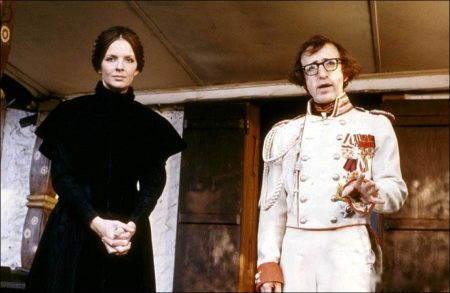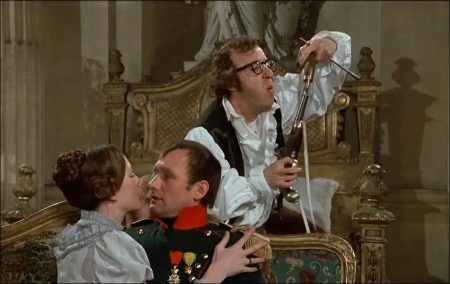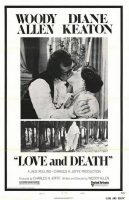Love and Death movie storyline. Despite his protestations, the aloof and politically ambivalent Boris Grushenko (Woody Allen) is gradually drawn into the Russian army during the Napoleonic invasion of Russia, and despite his cowardly ways, he becomes a war hero.
This makes him a potential partner for the lovely Sonja (Diane Keaton), who has long been the woman of his dreams, but who had never been more than a friend to him. Sonja’s love had always been directed at Boris’ brother Ivan. When Ivan’s death in battle clears the way for romance, Sonja’s doubts about whether she loves Boris ensure that her relationship with Boris develops very slowly, Bit by bit, however, they fall in love and that love continually deepens.
Improbably, and as a result of Sonja’s goading, Boris’ pacifist philosophies evolve into activism to the point that he and Sonja plot to assassinate Napoleon (James Tolkan), but somebody else beats them to it by minutes. Unfortunately, Boris is the one discovered at the crime scene, and he is arrested and sentenced to death.
While in prison, the atheist Boris is, strangely, transformed into a man of deep religious faith and he is visited by an angel that promises to save him from the firing squad. Unfortunately, his execution does take place, leaving Boris disillusioned, and at the moment of his death, his personal philosophy has settled into the realization that love and death are the true essence of the human experience, and that embracing deep religious and metaphysical philosophies, while intellectually stimulating, is an ultimately meaningless, fanciful pursuit.
Love and Death is a 1975 American comedy film by Woody Allen. It is a satire on Russian literature starring Allen and Diane Keaton as Boris and Sonja, Russians living during the Napoleonic Era who engage in mock-serious philosophical debates. Allen considered it the funniest film he had made up until that point.
Coming between Allen’s Sleeper and Annie Hall, Love and Death is in many respects an artistic transition between the two. Allen pays tribute to the humor of The Marx Brothers, Bob Hope and Charlie Chaplin throughout the film. The dialogue and scenarios parody Russian novels, particularly those by Dostoyevsky and Tolstoy, such as The Brothers Karamazov, Crime and Punishment, The Gambler, The Idiot and War and Peace. This includes a dialogue between Boris and his father in which each line alludes to, or is composed entirely of, Dostoyevsky titles.
The use of Prokofiev on the soundtrack adds to the Russian flavor of the film. Prokofiev’s “Troika” from the Lieutenant Kijé Suite is featured prominently, for the film’s opening and closing credits and in selected scenes in the film when a “bouncy” theme is required. The battle scene is accompanied with music from Prokofiev’s Alexander Nevsky cantata. Boris is marched to his execution to the “March” from Prokofiev’s The Love for Three Oranges.
Some of the humor is straightforward; other jokes rely on the viewer’s awareness of classic literature or contemporary European cinema. For example, the final shot of Keaton is a reference to Ingmar Bergman’s Persona. The sequence with the stone lions is a parody of Sergei Eisenstein’s Battleship Potemkin, while the Russian battle against Napoleon’s army heavily parodies the same film’s “Odessa steps” sequence. Bergman’s The Seventh Seal is parodied several times, including during the climax.
Love and Death (1975)
Directed by: Woody Allen
Starring: Woody Allen, Diane Keaton, Georges Adet, Frank Adu, Edmond Ardisson, Féodor Atkine, Albert Augier, Yves Barsacq, Lloyd Battista, Eva Betrand, Gérard Buhr, Yves Brainville
Screenplay by: Woody Allen
Production Design by: Suzanne Wiesenfeld
Cinematography by: Ghislain Cloquet
Film Editing by: Ron Kalish, Ralph Rosenblum
Costume Design by: Gladys de Segonzac
Set Decoration by:
Art Direction by: Willy Holt
MPAA Rating: None.
Distributed by: United Artists
Release Date: June 10, 1975
Views: 253








